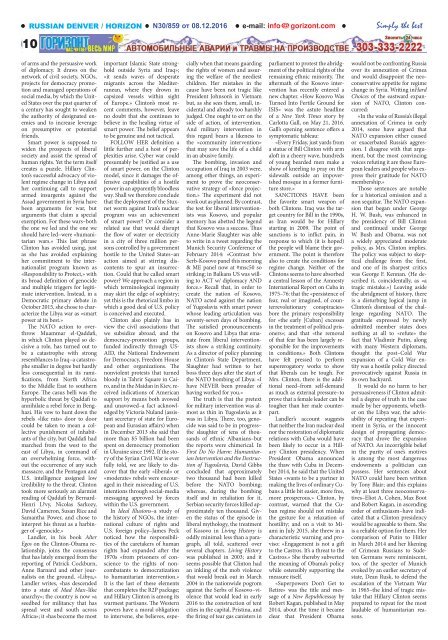Горизонт 30/859
Горизонт (газета) — (Gorizont англ. Horizon ) первая и наиболее влиятельная газета, издающаяся на русском языке в штатеКолорадо, США. Еженедельник, выходит по пятницам, формат Таблоид, 128 цветных и чернобелых страниц, распространяется в городах, составляющих метрополию Денвера (Большой Денвер), и в других населенных пунктах штата Колорадо от графства Саммит до графства Эль—Пасо. Полная электронная версия газеты «Горизонт» доступна в сети Интернет. Подробнее http://en.wikipedia.org/wiki/Gorizont_(newspaper
Горизонт (газета) — (Gorizont англ. Horizon ) первая и наиболее влиятельная газета, издающаяся на русском языке в штатеКолорадо, США. Еженедельник, выходит по пятницам, формат Таблоид, 128 цветных и чернобелых страниц, распространяется в городах, составляющих метрополию Денвера (Большой Денвер), и в других населенных пунктах штата Колорадо от графства Саммит до графства Эль—Пасо. Полная электронная версия газеты «Горизонт» доступна в сети Интернет. Подробнее http://en.wikipedia.org/wiki/Gorizont_(newspaper
You also want an ePaper? Increase the reach of your titles
YUMPU automatically turns print PDFs into web optimized ePapers that Google loves.
RUSSIAN DENVER / HORIZON<br />
10<br />
N<strong>30</strong>/<strong>859</strong> от 08.12.2016 e-mail: info@gorizont.com Simply the best<br />
of arms and the persuasive work<br />
of diplomacy. It draws on the<br />
network of civil society, NGOs,<br />
projects for democracy promotion<br />
and managed operations of<br />
social media, by which the United<br />
States over the past quarter of<br />
a century has sought to weaken<br />
the authority of designated enemies<br />
and to increase leverage<br />
on presumptive or potential<br />
friends.<br />
Smart power is supposed to<br />
widen the prospects of liberal<br />
society and assist the spread of<br />
human rights. Yet the term itself<br />
creates a puzzle. Hillary Clinton’s<br />
successful advocacy of violent<br />
regime change in Libya and<br />
her continuing call to support<br />
armed insurgents against the<br />
Assad government in Syria have<br />
been arguments for war, but<br />
arguments that claim a special<br />
exemption. For these wars–both<br />
the one we led and the one we<br />
should have led–were «humanitarian<br />
wars.» This last phrase<br />
Clinton has avoided using, just<br />
as she has avoided explaining<br />
her commitment to the internationalist<br />
program known as<br />
«Responsibility to Protect,» with<br />
its broad definition of genocide<br />
and multiple triggers for legitimate<br />
intervention. Instead, in a<br />
Democratic primary debate in<br />
October 2015, she chose to characterize<br />
the Libya war as «smart<br />
power at its best.»<br />
The NATO action to overthrow<br />
Muammar el-Qaddafi,<br />
in which Clinton played so decisive<br />
a role, has turned out to<br />
be a catastrophe with strong<br />
resemblances to Iraq–a catastrophe<br />
smaller in degree but hardly<br />
less consequential in its ramifications,<br />
from North Africa<br />
to the Middle East to southern<br />
Europe. The casus belli was the<br />
hyperbolic threat by Qaddafi to<br />
annihilate a rebel force in Benghazi.<br />
His vow to hunt down the<br />
rebels «like rats» door to door<br />
could be taken to mean a collective<br />
punishment of inhabitants<br />
of the city, but Qaddafi had<br />
marched from the west to the<br />
east of Libya, in command of<br />
an overwhelming force, without<br />
the occurrence of any such<br />
massacre, and the Pentagon and<br />
U.S. intelligence assigned low<br />
fcredibility to the threat. Clinton<br />
ytook more seriously an alarmist<br />
reading of Qaddafi by Bernard-<br />
Henri L?vy, Nicolas Sarkozy,<br />
David Cameron, Susan Rice and<br />
Samantha Power, and chose to<br />
interpret his threat as a harbinger<br />
of «genocide.»<br />
Landler, in his book Alter<br />
Egos on the Clinton-Obama relationship,<br />
joins the consensus<br />
kthat has lately emerged from the<br />
reporting of Patrick Cockburn,<br />
Anne Barnard and other journalists<br />
on the ground. «Libya,»<br />
Landler writes, «has descended<br />
into a state of Mad Max–like<br />
anarchy»; the country is now «a<br />
seedbed for militancy that has<br />
spread west and south across<br />
Africa»; it «has become the most<br />
important Islamic State stronghold<br />
outside Syria and Iraq»;<br />
«it sends waves of desperate<br />
migrants across the Mediterranean,<br />
where they drown in<br />
capsized vessels within sight<br />
of Europe.» Clinton’s most recent<br />
comments, however, leave<br />
no doubt that she continues to<br />
believe in the healing virtue of<br />
smart power. The belief appears<br />
to be genuine and not tactical.<br />
FOLLOW HER definition a<br />
little further and a host of perplexities<br />
arise. Cyber war could<br />
presumably be justified as a use<br />
of smart power, on the Clinton<br />
model, since it damages the offensive<br />
capabilities of a hostile<br />
power in an apparently bloodless<br />
way. Shall we therefore conclude<br />
that the deployment of the Stuxnet<br />
worm against Iran’s nuclear<br />
program was an achievement<br />
of smart power? Or consider a<br />
related use that would disrupt<br />
the flow of water or electricity<br />
in a city of three million persons<br />
controlled by a government<br />
hostile to the United States–an<br />
action aimed at stirring discontents<br />
to spur an insurrection.<br />
Could that be called smart<br />
power? We approach a region in<br />
which terminological ingenuity<br />
may skirt the edge of sophistry;<br />
yet this is the rhetorical limbo in<br />
which a good deal of U.S. policy<br />
is conceived and executed.<br />
Clinton also plainly has in<br />
view the civil associations that<br />
we subsidize abroad, and the<br />
democracy-promotion groups,<br />
funded indirectly through US-<br />
AID, the National Endowment<br />
for Democracy, Freedom House<br />
and other organizations. The<br />
nonviolent protests that turned<br />
bloody in Tahrir Square in Cairo,<br />
and in the Maidan in Kiev, received<br />
indications of American<br />
support by means both avowed<br />
and unavowed–a fact acknowledged<br />
by Victoria Nuland (assistant<br />
secretary of state for European<br />
and Eurasian affairs) when<br />
in December 2013 she said that<br />
more than $5 billion had been<br />
spent on democracy promotion<br />
in Ukraine since 1992. If the story<br />
of the Syrian Civil War is ever<br />
fully told, we are likely to discover<br />
that the early «liberal» or<br />
«moderate» rebels were encouraged<br />
in their misreading of U.S.<br />
intentions through social-media<br />
messaging approved by forces<br />
within the U.S. government.<br />
In Ideal Illusions–a study of<br />
the history of NGOs, the international<br />
culture of rights and<br />
U.S. foreign policy–James Peck<br />
noticed how the responsibilities<br />
of the caretakers of human<br />
rights had expanded after the<br />
1970s «from prisoners of conscience<br />
to the rights of noncombatants<br />
to democratization<br />
to humanitarian intervention.»<br />
It is the last of these elements<br />
that completes the R2P package;<br />
and Hillary Clinton is among its<br />
warmest partisans. The Western<br />
powers have a moral obligation<br />
to intervene, she believes, especially<br />
when that means guarding<br />
the rights of women and assuring<br />
the welfare of the neediest<br />
children. Her mistakes in the<br />
cause have been not tragic like<br />
President Johnson’s in Vietnam<br />
but, as she sees them, small, incidental<br />
and already too harshly<br />
judged. One ought to err on the<br />
side of action, of intervention.<br />
And military intervention in<br />
this regard bears a likeness to<br />
the «community intervention»<br />
that may save the life of a child<br />
in an abusive family.<br />
The bombing, invasion and<br />
occupation of Iraq in 2003 were,<br />
among other things, an experiment<br />
to prove the neoconservative<br />
strategy of «force projection.»<br />
The experiment did not<br />
work out as planned. By contrast,<br />
the test for liberal interventionists<br />
was Kosovo, and popular<br />
memory has abetted the legend<br />
that Kosovo was a success. Thus<br />
Anne-Marie Slaughter was able<br />
to write in a tweet regarding the<br />
Munich Security Conference of<br />
February 2014: «Contrast b/w<br />
Serb-Kosovo panel this morning<br />
& ME panel now at #msc50 so<br />
striking; in Balkans US was willing<br />
to ACT w/ diplomacy AND<br />
force.» Recall that, in order to<br />
create the nation of Kosovo,<br />
NATO acted against the nation<br />
of Yugoslavia with smart power<br />
whose leading articulation was<br />
seventy-seven days of bombing.<br />
The satisfied pronouncements<br />
on Kosovo and Libya that emanate<br />
from liberal interventionists<br />
show a striking continuity.<br />
As a director of policy planning<br />
in Clinton’s State Department,<br />
Slaughter had written to her<br />
boss three days after the start of<br />
the NATO bombing of Libya: «I<br />
have NEVER been prouder of<br />
having worked for you.»<br />
The truth is that the pretext<br />
for military intervention was almost<br />
as thin in Yugoslavia as it<br />
was in Libya. There, too, genocide<br />
was said to be in progress–<br />
the slaughter of tens of thousands<br />
of ethnic Albanians–but<br />
the reports were chimerical. In<br />
First Do No Harm: Humanitarian<br />
Intervention and the Destruction<br />
of Yugoslavia, David Gibbs<br />
concluded that approximately<br />
two thousand had been killed<br />
before the NATO bombing;<br />
whereas, during the bombing<br />
itself and in retaliation for it,<br />
Serbian security forces killed approximately<br />
ten thousand. Given<br />
the status of the episode in<br />
liberal mythology, the treatment<br />
of Kosovo in Living History is<br />
oddly minimal: less than a paragraph,<br />
all told, scattered over<br />
several chapters. Living History<br />
was published in 2003; and it<br />
seems possible that Clinton had<br />
an inkling of the mob violence<br />
that would break out in March<br />
2004 in the nationwide pogrom<br />
against the Serbs of Kosovo–violence<br />
that would lead in early<br />
2016 to the construction of tent<br />
cities in the capital, Pristina, and<br />
the firing of tear gas canisters in<br />
parliament to protest the abridgment<br />
of the political rights of the<br />
remaining ethnic minority. The<br />
aftermath of the Kosovo intervention<br />
has recently entered a<br />
new chapter. «How Kosovo Was<br />
Turned Into Fertile Ground for<br />
ISIS» was the astute headline<br />
of a New York Times story by<br />
Carlotta Gall, on May 21, 2016.<br />
Gall’s opening sentence offers a<br />
symptomatic tableau:<br />
«Every Friday, just yards from<br />
a statue of Bill Clinton with arm<br />
aloft in a cheery wave, hundreds<br />
of young bearded men make a<br />
show of kneeling to pray on the<br />
sidewalk outside an impoverished<br />
mosque in a former furniture<br />
store.»<br />
SANCTIONS HAVE been<br />
the favorite smart weapon of<br />
both Clintons. Iraq was the target<br />
country for Bill in the 1990s,<br />
as Iran would be for Hillary<br />
starting in 2009. The point of<br />
sanctions is to inflict pain, in<br />
response to which (it is hoped)<br />
the people will blame their government.<br />
The point is therefore<br />
also to create the conditions for<br />
regime change. Neither of the<br />
Clintons seems to have absorbed<br />
a central lesson of the Amnesty<br />
International Report on Cuba in<br />
1975–76: that the «persistence of<br />
fear, real or imagined, of counterrevolutionary<br />
conspiracies»<br />
bore the primary responsibility<br />
for «the early [Cuban] excesses<br />
in the treatment of political prisoners»;<br />
and that «the removal<br />
of that fear has been largely responsible<br />
for the improvements<br />
in conditions.» Both Clintons<br />
have felt pressed to perform<br />
supererogatory works to show<br />
that liberals can be tough. For<br />
Mrs. Clinton, there is the additional<br />
need–from self-demand<br />
as much as external pressure–to<br />
prove that a female leader can be<br />
tougher than her male counterpart.<br />
Landler’s account suggests<br />
that neither the Iran nuclear deal<br />
nor the restoration of diplomatic<br />
relations with Cuba would have<br />
been likely to occur in a Hillary<br />
Clinton presidency. When<br />
President Obama announced<br />
the thaw with Cuba in December<br />
2014, he said that the United<br />
States «wants to be a partner in<br />
making the lives of ordinary Cubans<br />
a little bit easier, more free,<br />
more prosperous.» Clinton, by<br />
contrast, warned that the Cuban<br />
regime should not mistake<br />
the gesture for a relaxation of<br />
hostility; and on a visit to Miami<br />
in July 2015, she threw in a<br />
characteristic warning and proviso:<br />
«Engagement is not a gift<br />
to the Castros. It’s a threat to the<br />
Castros.» She thereby subverted<br />
the meaning of Obama’s policy<br />
while ostensibly supporting the<br />
measure itself.<br />
«Superpowers Don’t Get to<br />
Retire» was the title and message<br />
of a New Republicessay by<br />
Robert Kagan, published in May<br />
2014, about the time it became<br />
clear that President Obama<br />
would not be confronting Russia<br />
over its annexation of Crimea<br />
and would disappoint the neoconservative<br />
appetite for regime<br />
change in Syria. Writing inHard<br />
Choices of the eastward expansion<br />
of NATO, Clinton concurred:<br />
«In the wake of Russia’s illegal<br />
annexation of Crimea in early<br />
2014, some have argued that<br />
NATO expansion either caused<br />
or exacerbated Russia’s aggression.<br />
I disagree with that argument,<br />
but the most convincing<br />
voices refuting it are those European<br />
leaders and people who express<br />
their gratitude for NATO<br />
membership.»<br />
Those sentences are notable<br />
for a historical omission and a<br />
non sequitur. The NATO expansion<br />
that began under George<br />
H. W. Bush, was enhanced in<br />
the presidency of Bill Clinton<br />
and continued under George<br />
W. Bush and Obama, was not<br />
a widely appreciated moderate<br />
policy, as Mrs. Clinton implies.<br />
The policy was subject to skeptical<br />
challenge from the first,<br />
and one of its sharpest critics<br />
was George F. Kennan. (He described<br />
it, coincidentally, as «a<br />
tragic mistake.») Leaving aside<br />
the abridgment of history, there<br />
is a disturbing logical jump in<br />
Clinton’s dismissal of the challenge<br />
regarding NATO. The<br />
gratitude expressed by newly<br />
admitted member states does<br />
nothing at all to «refute» the<br />
fact that Vladimir Putin, along<br />
with many Western diplomats,<br />
thought the post–Cold War<br />
expansion of a Cold War entity<br />
was a hostile policy directed<br />
provocatively against Russia in<br />
its own backyard.<br />
It would do no harm to her<br />
persuasiveness if Clinton admitted<br />
a degree of truth in the case<br />
made by her opponents, whether<br />
on the Libya war, the advisability<br />
of repeating that experiment<br />
in Syria, or the innocent<br />
design of propagating democracy<br />
that drove the expansion<br />
of NATO. An incorrigible belief<br />
in the purity of one’s motives<br />
is among the most dangerous<br />
endowments a politician can<br />
possess. Her sentences about<br />
NATO could have been written<br />
by Tony Blair; and this explains<br />
why at least three neoconservatives–Eliot<br />
A. Cohen, Max Boot<br />
and Robert Kagan, in ascending<br />
order of enthusiasm–have indicated<br />
that a Clinton presidency<br />
would be agreeable to them. She<br />
is a reliable option for them. Her<br />
comparison of Putin to Hitler<br />
in March 2014 and her likening<br />
of Crimean Russians to Sudeten<br />
Germans were reminiscent,<br />
too, of the specter of Munich<br />
evoked by an earlier secretary of<br />
state, Dean Rusk, to defend the<br />
escalation of the Vietnam War<br />
in 1965–the kind of tragic mistake<br />
that Hillary Clinton seems<br />
prepared to repeat for the most<br />
laudable of humanitarian reasons.
















